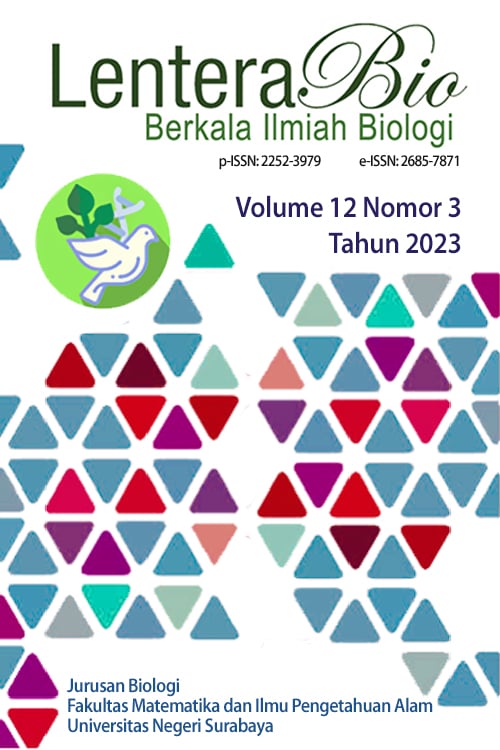The Effectiveness of Various Natural PGR Combination on Seed Germination, Growth and Yield of Red Chili (Capsicum annuum L.)
DOI:
https://doi.org/10.26740/lenterabio.v12n3.p307-316Keywords:
coconut water, shallot, bamboo shoot, phytohormoneAbstract
The demand for red chili peppers (Capsicum annuum) is increasing due to the relatively high needs in market. One way that can be done to support the cultivation of red chili plants is to use Plant Growth Regulator (PGR). However, the access to synthetic PGR is quite limited for farmers in rural area, so an alternative PGR that are easier to find, cheaper and environmentally friendly is needed. This study aims to determine the effect natural PGR’s combination made from shallots, bamboo shoots and coconut water in supporting seed germination, growth and production of red chili. This study used a Randomized Block Design (RBD) with 4 treatments which are the combinations of 50 ml/L shallot filtrate and 50 ml/L bamboo shoot filtrate, 50 ml/L bamboo shoot filtrate and 50 ml/L coconut water, 50 ml/L shallot filtrate and 50 ml/L coconut water, and a combination of the three. The data obtained then analyzed with one-way Anova Test followed by Duncan Test, if there was a significant influence. The results showed that there was a significant effect of natural PGR combination treatment on the growth of red chilli peppers, but there was no significant effect on seed germination and production. The most optimal natural PGR combination for red chili growth was the third treatment, a combination of shallot filtrate at 50 ml/L, bamboo shoot filtrate at 50 ml/L, and coconut water at 50 ml/L.
Key words: coconut water, shallot, bamboo shoot, phytohormone
Downloads
Published
How to Cite
Issue
Section
License
Copyright (c) 2023 LenteraBio : Berkala Ilmiah Biologi

This work is licensed under a Creative Commons Attribution-NonCommercial 4.0 International License.
Hak Cipta (c) LenteraBio: Berkala Ilmiah Biologi
Karya ini dilisensikan di bawah Lisensi Internasional Creative Commons Attribution-NonCommercial 4.0.
Pemberitahuan Hak Cipta.
Hak cipta dari artikel yang diterima untuk diterbitkan akan diberikan kepada jurnal sebagai penerbit jurnal. Hak cipta yang dimaksud meliputi hak untuk menerbitkan artikel dalam berbagai bentuk (termasuk cetak ulang). Jurnal mempertahankan hak penerbitan atas artikel yang diterbitkan.
 Abstract views: 1929
,
Abstract views: 1929
, PDF Downloads: 5052
PDF Downloads: 5052











